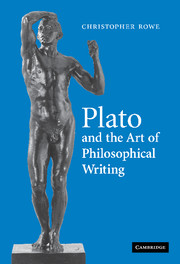Preface
Published online by Cambridge University Press: 22 September 2009
Summary
I offer in this book what is in some respects a new approach to Plato: one that attempts to take account of his strategies as a writer who writes, for the most part, in order to persuade his readers; an approach that attempts, in particular, to understand the way in which those strategies help to shape what he writes. In other words, my first concern is with understanding the nature of Platonic rhetoric. What he actually says, or has his main character – usually Socrates – say, is usually only a version of what he wants to say, designed to suit a particular audience on a particular occasion, as defined by the dramatis personae and the setting of the individual work; and he may well offer us different versions of the same thing, either in the same dialogue or, more usually, in others. It is one of the main claims of this book that trying to read off Plato's thinking from the surface of the dialogues is unlikely to be a reliable method for understanding him; especially when such a method is combined, as it often is, with a tendency to interpret different treatments of the same topic in chronological terms, that is, as evidence of ‘developments’ in his thinking. What will emerge, by the end of the book, is a Plato who will be, to most readers, and often for different reasons, unlike the Plato they have come to think they know.
- Type
- Chapter
- Information
- Plato and the Art of Philosophical Writing , pp. vii - xPublisher: Cambridge University PressPrint publication year: 2007



